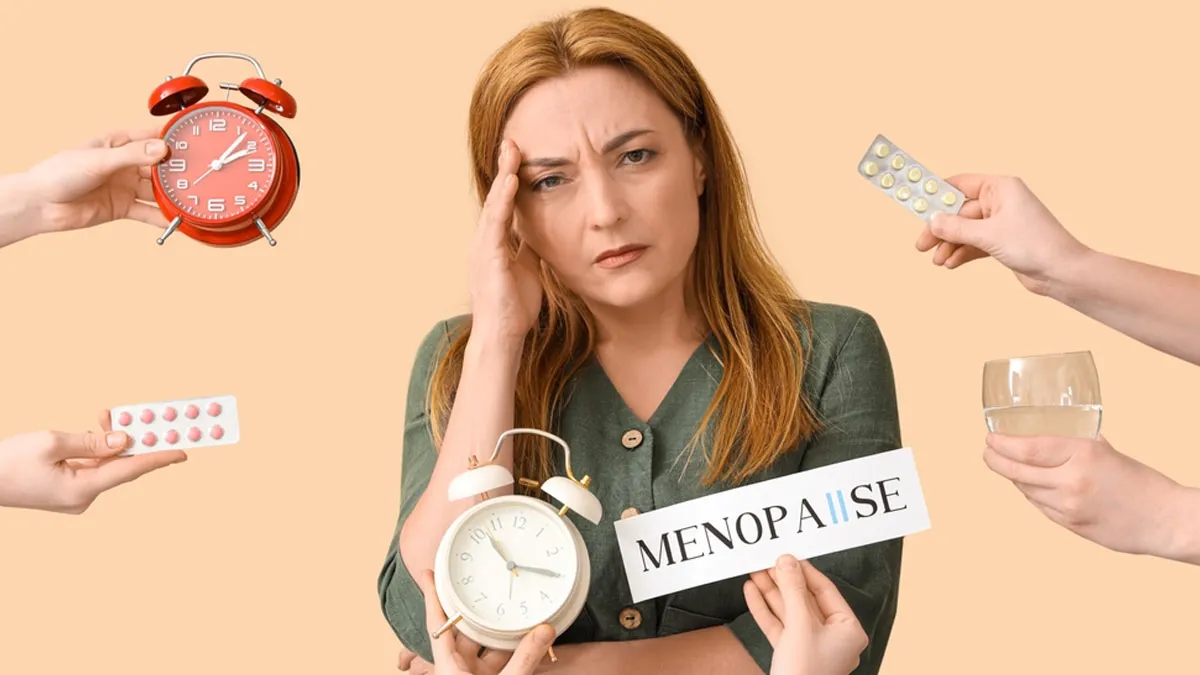
Menopause is a naturally occurring phase in every woman’s life. It marks the end of the menstrual cycle and indicates that they can no longer conceive naturally. During this change, women experience various symptoms and physical changes, which either resolve on their own in time or require special treatments, including hormone therapy.
Table of Content:-
Hormone therapy, also known as Hormone Replacement Therapy (HRT), can help relieve menopause symptoms and is also known to treat long-term health issues like osteoporosis. However, a common question that troubles many considering HRT is whether it is, or should be, a long-term management strategy for menopausal symptoms. To unravel the same, the OnlyMyHealth team interacted with a doctor.
Also Read: Menopause May Increase The Progression Of Multiple Sclerosis In Women, Study Warns
Common Menopause Symptoms

According to the World Health Organization (WHO), most women experience menopause between the ages of 45 and 55 years. It occurs when women's ovaries stop producing eggs and when the oestrogen levels in the body begin to decline. When these mechanisms come into play, women experience various symptoms, including:
- Irregular periods
- Hot flashes
- Sleep problems
- Mood changes
- Vaginal dryness
- Difficulty holding urine, or urine leaking when you sneeze, cough, or laugh
- Skin changes
- Joint and muscle pain
- Headaches and migraines
- Forgetfulness
- Low libido
Types Of Hormone Therapy To Manage Menopause Symptoms

According to Dr Taruna Dua, Senior Consultant and Unit Head - Unit 1 Obstetrics and Gynaecology, Aakash Healthcare, New Delhi, HRT can be divided into two types: oestrogen treatment and combination therapy.
Oestrogen treatment consists of taking oestrogen only, whereas combination treatment combines dosages of oestrogen and progesterone, or progestin.
"Progestins can lower your risk of uterine cancer, which is increased when you just take oestrogen. Combination treatment is commonly administered in the form of a pill or a skin patch, but it can also be administered by an IUD (intrauterine device) that your doctor inserts into your vagina," Dr Dua explains.
Benefits And Risks Of Hormone Therapy For Menopause Symptoms Management
There are several advantages and limitations to undergoing hormone therapy. The primary advantage of HRT is that it alleviates painful menopausal symptoms, says Dr Dua, adding that this can improve people's quality of life and allow them to resume activities they like.
Other health advantages of using HRT include:
- Lower risk of osteoporosis or fracturing a bone
- Better mood and general happiness
- Improved sleep quality
- Reduced risk of developing colon cancer
- Lower chance of developing diabetes
Possible risks include:
- Increased risk of uterine cancer (only if you still have a uterus and are not taking progestin and oestrogen).
- If you start using hormone replacement therapy 10 years after menopause, your risk of heart disease increases.
- An increased risk of blood clots and stroke.
- Increase in gallbladder disease risk
- Long-term usage raises the risk of breast cancer in certain women.
Also Read: Role Of Hormones In Heart Health: Expert Explains Why Women's Cardiovascular Risk Increases With Age
How To Know If Hormone Therapy Is The Right Choice To Manage Menopause Symptoms

Deciding if you should consider hormone therapy or whether or not it is right for you is a personal choice that should be made in consultation with a doctor.
It is important that you weigh the benefits against the risks based on your health status and history and the kind of symptoms you experience.
You must also consider factors, including the severity of your menopausal symptoms, your age, and your risk factors for conditions like heart disease, stroke, blood clots, and certain cancers.
Dr Dua shares, "Talk to your doctor about your specific symptoms and health concerns to see if hormone therapy is a viable treatment choice for you. Keep the discussion continuing throughout your menopause."
"As researchers get a better understanding of hormone therapy and other menopausal therapies, recommendations may alter. If you are still experiencing troublesome menopausal symptoms, consult your doctor on a frequent basis to discuss treatment alternatives," she adds.
Natural Methods To Treat Menopause Symptoms
While it’s best to avoid intervening with your body’s natural processes, in certain situations, where the menopausal symptoms make it difficult for you to go about your daily activities, it is crucial to take certain steps. Although HRT is a scientifically proven method to manage menopausal symptoms, there are natural remedies that might help.
According to Dr Dua, yoga and Cognitive Behaviour Therapy (CBT) can help alleviate the effects of menopausal symptoms while also increasing emotional well-being and sleep. You can also indulge in hypnotherapy, which can reduce the severity of hot flashes. While there is less proof of its efficacy, some people find it useful, she notes.
Additionally, paced breathing may help some individuals handle the anxiety associated with hot flashes. You can take 15 minutes of slow, deep abdominal breathing twice a day.
A review of clinical trials conducted between 1994 and 2016 also identified several medicinal plants effective in managing menopausal symptoms, including sage (Salvia officinalis), lemon balm (Melissa officinalis), black cohosh (Cimicifuga racemosa), fenugreek (Trigonella foenum-graecum), evening primrose (Oenothera biennis), and red clover (Trifolium pratense), among others.
As per research, these plants help alleviate symptoms like hot flashes and improve overall menopausal health. However, note that further research is needed to confirm their long-term efficacy and safety.
Also watch this video
How we keep this article up to date:
We work with experts and keep a close eye on the latest in health and wellness. Whenever there is a new research or helpful information, we update our articles with accurate and useful advice.
Current Version